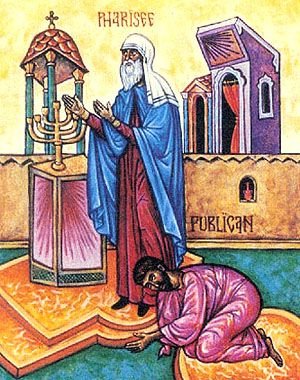Orthodoxy. Sunday of Publican and Pharisee
Being and orthodox I would like to share some pieces of the Churches teachings with you. Today the Orthodox Church celebrates the Sunday of publican and pharisee the first sunday of the preparation for the great lent.

18.10 Two men went up into the temple to pray; the one a Pharisee, and the other a publican.
18:11 The Pharisee stood and prayed thus with himself, God, I thank thee, that I am not as other men are, extortioners, unjust, adulterers, or even as this publican.
18:12 I fast twice in the week, I give tithes of all that I possess.
18:13 And the publican, standing afar off, would not lift up so much as his eyes unto heaven, but smote upon his breast, saying, God be merciful to me a sinner.
18:14 I tell you, this man went down to his house justified rather than the other: for every one that exalteth himself shall be abased; and he that humbleth himself shall be exalted.
What do fathers of church say about this parable
Faith and contrition make prayer and supplication for the remission of sins effective, once evil deeds have been renounced, but despair and hardness of heart make it ineffectual. Thanksgiving for the benefits received from God is made acceptable by humility and not looking down on those who lack them. it is rendered unacceptable, however, by being conceited, as if those benefits resulted from our own efforts and knowledge, and by condemning those who have not received them. the Pharisee’s behaviour and words prove he was afflicted with both these diseases. He went up to the Temple to give thanks, not to make supplication and, like a wretched fool, mingled conceit and condemnation of others with his thanksgiving. For he stood and prayed thus with himself: “God, I thank thee, that I am not as other men are, extortioners, unjust, adulterers” St. Gregory Palama
Additional Quotes of the Fathers on Humility
An [Elder] was asked, "What is humility?" and he said in reply, "Humility is a great work, and a work of God. The way of humility is to undertake bodily labour and believe yourself a sinner and make yourself subject to all." Then a brother said, "What does it mean, to be subject to all?" The [Elder] answered, "To be subject to all is not to give your attention to the sins of others but always to give your attention to your own sins and to pray without ceasing to God."
An [Elder] said, "Every time a thought of superiority or vanity moves you, examine your conscience to see if you have kept all the commandments, whether you love your enemies, whether you consider yourself to be an unprofitable servant and the greatest sinner of all. Even so, do not pretend to great ideas as though you were perfectly right, for that thought destroys everything."
As Abba Macarius was returning to his cell from the marsh carrying palm-leaves, the devil met him with a sharp sickle and would have struck him but he could not. He cried out, "Great is the violence I suffer from you, Macarius, for when I want to hurt you, I cannot. But whatever you do, I do and more also. You fast now and then, but I am never refreshed by any food; you often keep vigil, but I never fall asleep. Only in one thing are you better than I am and I acknowledge that." Macarius said to him, "What is that?" and he replied, "It is because of your humility alone that I cannot overcome you."
The [Elders] used to say, "When we do not experience warfare, we ought so much the more to humiliate ourselves. For God seeing our weakness, protects us; when we glorify ourselves, he withdraws his protection and we are lost."
(http://dialogues.stjohndfw.info/2009/03/the-egypts-desert-fathers-humility/)
"...true humility does not say humble words, nor does it assume humble looks, it does not force oneself either to think humbly of oneself, or to abuse oneself in self-belittlement. Although all such things are the beginning, the manifestations and the various aspects of humility, humility itself is grace, given from above. There are two kinds of humility, as the holy fathers teach: to deem oneself the lowest of all beings and to ascribe to God all one's good actions. The first is the beginning, the second the end."
St. Gregory of Sinai
(Texts on Commandments and Dogmas no. 115)
"...we have never achieved anything good on our own, but all good things are ours from God by grace, and come as it were from nothingness into being. For 'what do you have which you did not receive?' asks St. Paul - receive, that is, freely from God; 'and if you received it, why do you boast as if you had not received it' (I Cor. 4:7), but had achieved it by yourself? Yet by yourself you cannot achieve anything, for the Lord has said: 'Without Me, you can do nothing' (John 15:5)."
St. Peter of Damascus
Kontakion — Tone 4
Let us flee from the pride of the Pharisee! / And learn humility from the Publican’s tears! / Let us cry to our Savior, / have mercy on us, / only merciful One!
Have a great day everyone.
Interesting, but it was difficult for me to read the language. My English is not that developed.
If u want maybe you could find it in your native language. Where r u from?
The Netherlands. Not many orthodox people here.
R u orthodox?